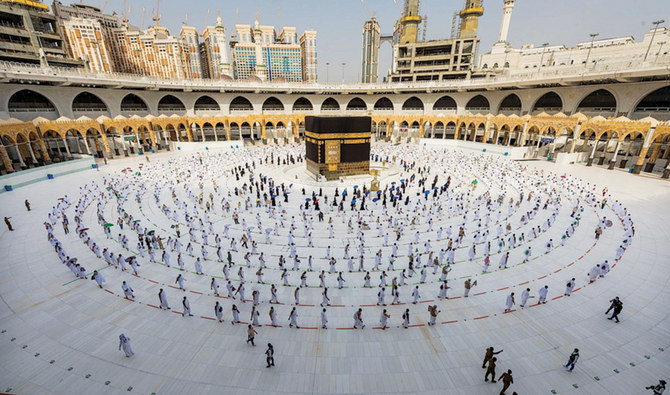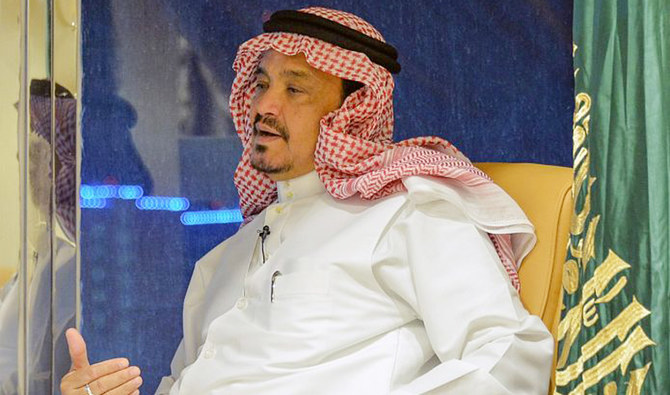JEDDAH: The Saudi Hajj and Umrah Ministry has shared some of the secrets behind what made the “exceptional” 2020 Hajj season a success, with zero transmitted cases of the COVID-19 pandemic.
In an exclusive interview with Arab News, Minister of Hajj and Umrah Dr. Muhammad Saleh bin Taher Benten said that the government utilized the latest technology to improve the pilgrim experience this season.
Speaking about his ministry’s efforts in preventing the spread of COVID-19, Benten said that it implemented precautionary measures in every phase of the pilgrimage, starting with the pilgrims being quarantined at home.
It also introduced institutional quarantine from the fourth to the eighth day of the Hajj, gave pilgrims electronic bracelets and enforced social distancing.
“For the second consecutive year, the ministry used the electronic platform through the ‘smart card’ application, taking into account the pilgrims’ special needs in terms of the journey’s organization and management,” he said. “The platform is a digital ID granted to the pilgrim that is directly linked with the ‘Smart Hajj’ application supervised by the ministry.”
He added that the digital ID contains the pilgrims’ personal, health and housing information, such as the numbers of their group, and which bus seat and bed has been allocated to them.
“It also enables pilgrims to know their special program, gathering points and times of departure. Moreover, the ministry registered pilgrims electronically by using an interactive platform that links 52 systems and is complemented by 30 governmental and nongovernmental bodies,” he added.
Relying on those services, the minister said, came as part of the ministry’s strategy to establish virtual platforms that reduce procedures, and keep pace with the technical development required to achieve the Saudi Vision 2030 goal to serve pilgrims.
With every Hajj season having its own challenges, the Hajj and Umrah Ministry has enjoyed success after success. However, the 2020 season put the ministry to an unprecedented test.
“As every year, Saudi Arabia harnesses all its potential and energies to make the Hajj season a success, prioritizing the safety and security of the pilgrims.
FASTFACTS
• When Saudi Arabia took the decision to hold Hajj for a limited number of people, it was keen to comply with all health and precautionary measures.
• This step was taken based on scientific decisions and thorough research studies that would ensure that pilgrims can perform Hajj rituals safely.
• The ministry and all Hajj-related authorities have learned many lessons from the last Hajj experience, where social distancing was implemented.
“However, last year’s Hajj was a little different with the whole world facing the COVID-19 outbreak. During the 2020 Hajj season, the Saudi government faced a rare and unprecedented challenge, and thanks to God, the Kingdom was able to address it,” he said.
He added: “When Saudi Arabia took the decision to hold Hajj for a limited number of people, it was keen to comply with all health and precautionary measures. This step was taken based on scientific decisions and thorough research studies that would ensure that pilgrims could perform Hajj rituals safely.”
He said that the efforts exerted by the Saudi government in this regard and the various facilities provided to pilgrims at different levels were highly praised, most notably the health precautions of social distancing and adhering to health requirements.
The ministry and all Hajj-related authorities have learned many lessons from the last Hajj experience, where social distancing was implemented. The minister shed light on the most notable lessons, and how they can benefit future seasons.
“The ministry implemented social distancing protocols in all phases of the pilgrims moving between the holy sites through limiting the seating capacity of buses to 50 percent,” said Benten.
As for the residence of pilgrims, officials conducted tests for all pilgrims and workers and assigned health observers to ensure guidelines were maintained.
He added: “Moreover, 49-seat buses were assigned to each group of 22 passengers, and Hajj routes were fixed in a way to achieve social distancing. These measures resulted in zero transmission of COVID-19 between pilgrims and their service providers.”
As many government officials have said in the past, preparations for the next Hajj season begin as soon as the previous iteration ends.
One of the advantages of the extraordinary 2020 season was that the ministry could accelerate projects in the holy sites.
Benten told Arab News that his ministry works every year on developing the services provided for pilgrims, to enrich their experience through providing diverse programs and initiatives.
“The ministry always benefits from the accumulated experiences, large-scale projects and personnel to provide the finest services with the best levels for pilgrims,” he said. “One of those initiatives that benefited the ministry, which will continue to implement it in the future, is the preparation and improvement of the holy sites, the preparation of a comprehensive scheme to expand the capacity and receive the largest number of pilgrims in order to achieve comfort, security, safety and environmental dimensions, reduce pollution and study spatial dimensions.”
He added that the ministry aims for a record time reception of pilgrims through the unified center to analyze data, enhancing crowd control efficiency and rapid intervention, reducing time to organize pilgrims, and distributing them equally.
The Hajj and Umrah companies have been affected by the COVID-19 pandemic; with some failing to meet their obligations towards their employees.
“The Ministry of Hajj and Umrah has provided a myriad of facilities to these companies since the outbreak of the COVID-19 pandemic through developing work and encouraging mergers and investments in Umrah companies,” Benten said.
He added that the ministry has also contributed to reducing the value of financial security for nondefaulting active Umrah companies to SR250,000 ($66,666) for six months.
“The ministry also authorized Umrah companies to reduce their capital in the commercial register to SR500,000 ($133,332), close their doors for one year, and postpone payment of nonessential violations for six months,” said Benten.
The ministry launched the business clinics unit, which is one of its programs aimed at helping companies review their mechanisms and operational plans.
“The Ministry of Hajj and Umrah will also be organizing many workshops and training programs for Umrah companies on strategies to recover from the COVID-19 crisis and the means of developing their business with efficiency,” he concluded.

















